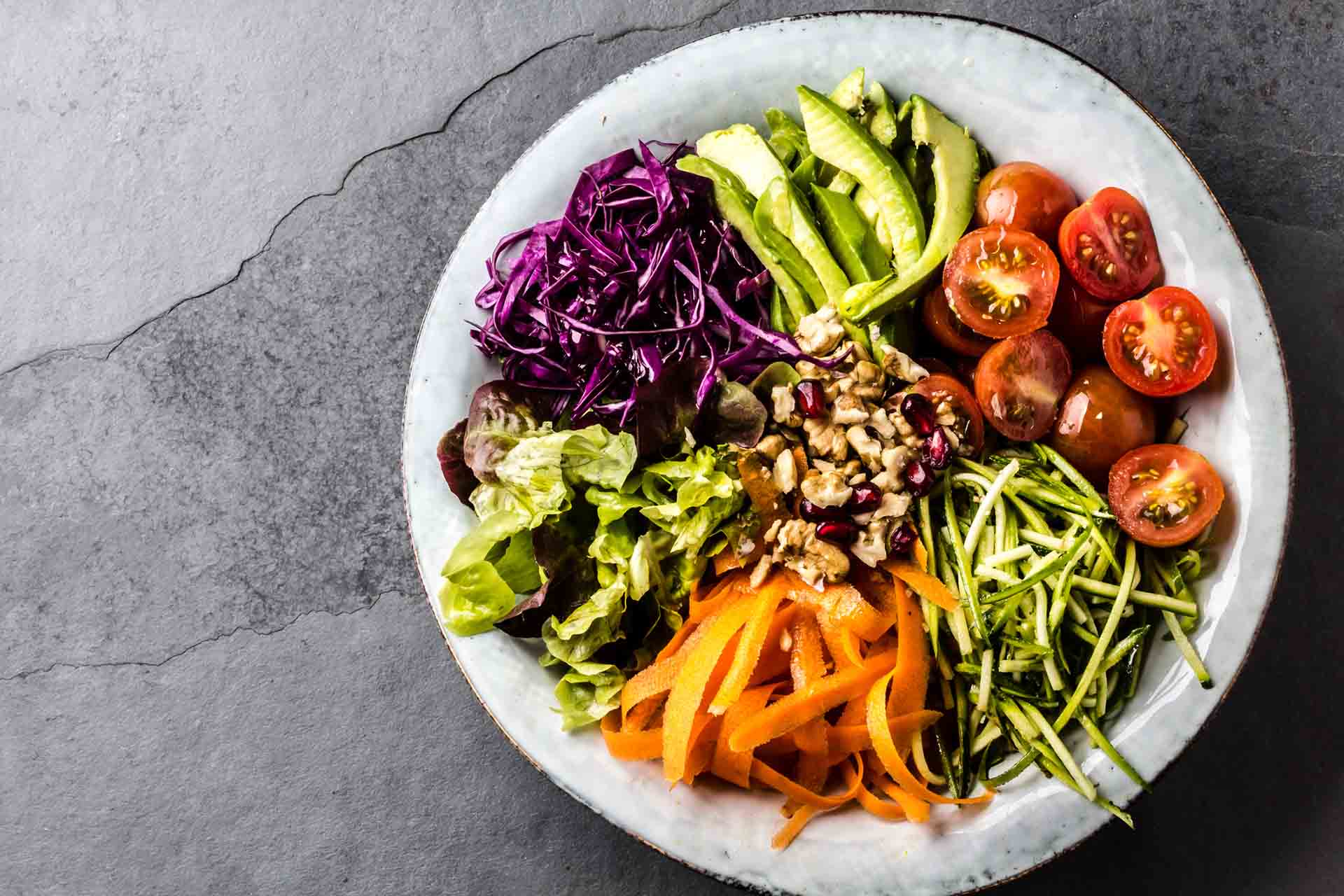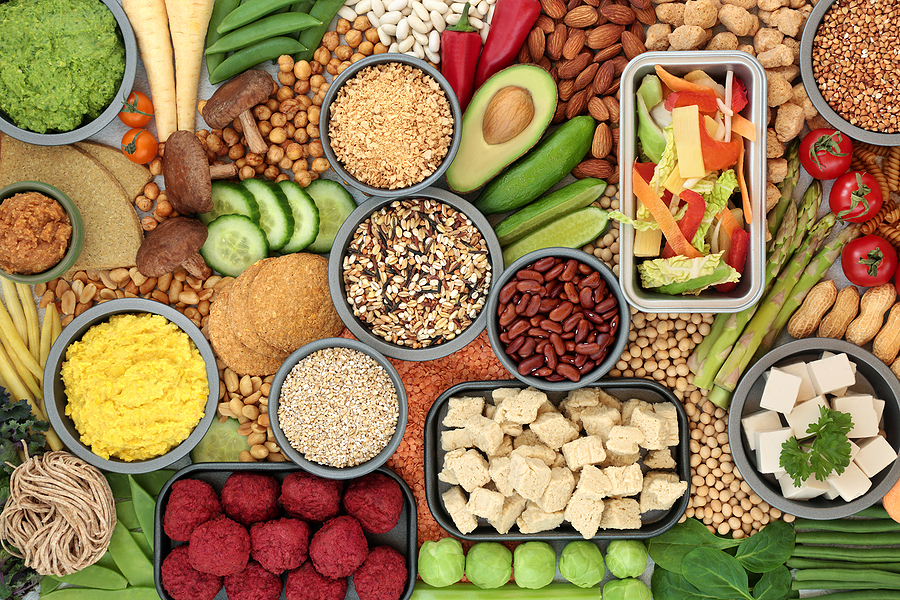Gluten Free BBQ Sauce Recipes That Even Meat-Eaters Will Love
Gluten Free BBQ Sauce Recipes That Even Meat-Eaters Will Love
Blog Article
All Regarding Healthy And Balanced Food: Benefits of Taking On Plant Based Options
The discussion surrounding plant-based diet regimens has acquired considerable interest recently. Numerous people are discovering the possible health and wellness benefits, nutritional benefits, and environmental influences connected with these nutritional selections. As individuals come to be extra aware of their food's impact on health and sustainability, inquiries emerge concerning the usefulness of adopting such a way of life. What particular modifications can one anticipate, and how might these selections improve not only individual health and wellness however likewise the earth's future?
Understanding Plant-Based Diets
Although lots of people connect plant-based diets primarily with vegetarianism or veganism, these diet regimens can incorporate a large range of consuming patterns that focus on whole, minimally processed plant foods. Such diets usually consist of fruits, veggies, entire grains, seeds, nuts, and legumes, while eliminating or restricting animal products. This versatility enables people to tailor their dietary selections according to nutritional needs and personal choices. Some might adopt a mostly plant-based diet regimen while still periodically consuming meat or dairy products, commonly referred to as a flexitarian method. The emphasis remains on incorporating even more plant foods, which can lead to a varied array of meals and tastes. Understanding these numerous interpretations of plant-based eating is important for valuing its availability and appeal in modern food culture.
Wellness Benefits of Plant-Based Foods
The health and wellness advantages of plant-based foods are significant, using a nutrient thickness advantage that supports total wellness. Research suggests that these foods can boost heart wellness and play an essential duty in effective weight administration. By integrating a lot more plant-based alternatives, people might enhance their dietary options and advertise long-lasting health and wellness.
Nutrient Density Benefit
Nutrient density plays an essential role in the wellness advantages of plant-based foods, making them an engaging option for those looking for a well balanced diet plan. Plant-based foods, such as fruits, veggies, legumes, nuts, and entire grains, are usually abundant in necessary vitamins, minerals, and anti-oxidants while being lower in calories. This high nutrient density permits people to take in fewer calories while still fulfilling their dietary needs. Additionally, these foods are loaded with dietary fiber, advertising gastrointestinal health and wellness and helping in weight management. By incorporating nutrient-dense plant-based alternatives, customers can enhance their total health and wellness, support their immune systems, and minimize the danger of chronic diseases. Eventually, the nutrient thickness of plant-based foods highlights their significance in a health-conscious way of living.
Heart Wellness Enhancement

Weight Management Support
In addition to advertising heart health, a plant-based diet can significantly aid in weight monitoring. This dietary approach emphasizes entire foods such as fruits, vegetables, beans, nuts, and entire grains, which are usually reduced in calories and higher in fiber compared to animal-based items. The high fiber web content aids increase satiety, decreasing overall calorie consumption. Additionally, plant-based diet regimens are commonly rich in crucial nutrients while reduced in undesirable fats, making it easier to preserve a healthy weight. Plant Based Beef. Research study shows that individuals who take on go now a plant-based lifestyle often tend to have lower body mass indexes (BMIs) and experience even more successful weight reduction compared to those that consume meat-heavy diet regimens. As a result, embracing plant-based choices is a critical selection for effective weight administration
Nutritional Worth of Plant-Based Active Ingredients
Plant-based components are abundant in essential nutrients, providing a diverse variety of vitamins, minerals, and anti-oxidants that add to overall health. A comparison of protein resources discloses that while pet products are frequently seen as exceptional, lots of plant-based alternatives provide ample protein and other useful substances. Comprehending the nutritional value of these ingredients can help individuals make educated nutritional selections.
Essential Nutrients in Plants
Nutrient-rich active ingredients discovered in plants use a varied variety of necessary nutrients that contribute considerably to general health and wellness. These components are abundant in vitamins A, C, and K, which sustain immune feature, vision, and blood clot, respectively. On top of that, plants supply vital minerals such as potassium, calcium, and magnesium, essential for heart health, muscular tissue function, and bone toughness. The existence of fiber in plant-based foods aids digestion and advertises a healthy and balanced digestive tract microbiome. Anti-oxidants, discovered generously in fruits and vegetables, aid battle oxidative tension and reduce inflammation. Numerous plant foods are reduced in calories yet high in nutrients, making them an exceptional choice for those looking for to maintain a healthy and balanced weight while guaranteeing ideal nutrient intake.

Comparing Protein Sources
Protein resources differ significantly in their dietary profiles, with plant-based components using distinct advantages. Unlike pet healthy proteins, which usually have hydrogenated fats and cholesterol, plant healthy proteins have a tendency to be lower in these unhealthy components. Legumes, nuts, seeds, and entire grains are abundant in vital amino acids, fiber, vitamins, and minerals. Lentils give high protein content along with considerable iron and folate, while quinoa is a complete healthy protein, using all nine crucial amino acids. In addition, plant-based proteins are often come with by antioxidants and phytochemicals that sustain general health. The change to plant-based protein resources not only boosts nutritional consumption but additionally lines up with lasting dietary practices, minimizing environmental effect and promoting lasting health advantages.
Environmental Effect of Plant-Based Eating
As understanding of environment modification expands, numerous people are exploring lasting nutritional choices that can substantially reduce their ecological footprint. Plant-based eating has actually emerged as a considerable factor helpful hints to lowering greenhouse gas this website discharges, which are largely related to animals production. The cultivation of fruits, grains, veggies, and vegetables commonly calls for fewer resources, such as water and land, contrasted to animal farming. Additionally, plant-based diet regimens can cause decreased deforestation, as much less land is required for grazing livestock or expanding pet feed. By moving towards plant-based alternatives, customers can support biodiversity and promote much healthier ecological communities. Generally, accepting plant-based eating not only benefits personal health yet additionally represents a vital action toward ecological sustainability and conservation initiatives.
Overcoming Common Misconceptions
While numerous people recognize the advantages of a plant-based diet regimen, numerous mistaken beliefs commonly prevent them from completely embracing this way of life. An usual idea is that plant-based diet plans lack enough healthy protein; nonetheless, numerous plant resources, such as beans, nuts, and tofu, give ample healthy protein. Furthermore, some assume that this diet plan is costly, when in truth, staples like beans, rice, and seasonal vegetables can be quite inexpensive. One more mistaken belief is that plant-based eating is overly limiting, whereas it actually uses a diverse selection of foods and flavors. Finally, several worry that a plant-based diet might cause shortages, yet with correct preparation, people can obtain all necessary nutrients, consisting of nutrients, while enjoying a wide range of tasty meals.
Tips for Transitioning to a Plant-Based Way of living
Making the change to a plant-based way of life can be an enriching experience, though it often calls for some assistance to navigate the first modifications. People are encouraged to begin progressively, integrating even more fruits, veggies, legumes, and whole grains right into their dishes while decreasing meat and dairy intake. Meal planning is crucial; preparing a weekly menu can assist reduce the change and stop final undesirable choices. Checking out cooking approaches and new recipes can likewise maintain and improve the experience excitement about plant-based consuming. Additionally, joining support system or areas can give motivation and share important suggestions. Remaining notified concerning nourishment warranties well balanced meals, preventing deficiencies while fostering a healthy, satisfying plant-based lifestyle.

Delicious Plant-Based Dish Ideas
Discovering delicious plant-based dish concepts can inspire individuals to welcome a more nourishing diet. One preferred option is a passionate quinoa salad, including cherry tomatoes, cucumber, and a tangy lemon-tahini dressing. An additional favorite is a mouthwatering lentil stew, loaded with carrots, celery, and fragrant herbs, ideal for a comforting dinner. For breakfast, over night oats made with almond milk, chia seeds, and covered with fresh berries offer a nutritious beginning to the day. In addition, a dynamic vegetable stir-fry with tofu and a selection of vivid veggies can be a quick yet satisfying dish. Creamy avocado toast on whole-grain bread, sprinkled with flavors and seeds, supplies a straightforward yet savory treat. These dishes display the selection and splendor of plant-based eating.

Frequently Asked Questions
Can a Plant-Based Diet Plan Offer Enough Healthy Protein?
The concern of whether a plant-based diet regimen can give adequate protein prevails. Many sources, consisting of beans, nuts, seeds, and entire grains, can meet healthy protein needs effectively, sustaining a balanced and nutritious diet for people.
Are Plant-Based Diets Ideal for Children?
The viability of plant-based diet plans for youngsters depends upon careful preparation. Adequate nutrients need to be guaranteed, consisting of minerals, proteins, and vitamins. With correct assistance, such diet regimens can support healthy and balanced growth and advancement in youngsters.
Exactly how Do I Eat Out on a Plant-Based Diet?
Eating out on a plant-based diet includes looking for restaurants with diverse food selections, asking for adjustments, and discovering vegan-friendly options. Preparation in advance and communicating dietary choices can boost the dining experience while preserving nutritional selections.
What Prevail Irritants in Plant-Based Foods?
Usual allergens in plant-based foods include soy, gluten, nuts, and seeds - BBQ Sauces. Individuals complying with a plant-based diet regimen needs to know these allergens and review tags carefully to prevent negative responses and assure safe consumption
Can Plant-Based Diets Aid With Fat Burning?
Research indicates that adopting a plant-based diet plan may assist in fat burning due to its generally lower calorie density and higher fiber content. This combination can improve satiation, assisting individuals handle their caloric intake successfully. Numerous people connect plant-based diet plans generally with vegetarianism or veganism, these diet plans can include a large variety of consuming patterns that prioritize whole, minimally processed plant foods. Nutrient density plays an important duty in the health and wellness benefits of plant-based foods, making them an engaging choice for those looking for a balanced diet regimen. Plant-based diet plans have actually been shown to considerably boost heart wellness, as they usually have aspects that support cardiovascular feature. In enhancement to promoting heart health, a plant-based diet regimen can substantially help in weight administration. A common idea is that plant-based diet plans lack enough healthy protein; nevertheless, numerous plant resources, such as vegetables, nuts, and tofu, offer ample healthy protein.
Report this page